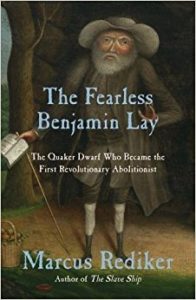Podcast: Play in new window | Download (Duration: 58:10 — 40.1MB)
Today, the curious case of Benjamin Lay: Englishman, Quaker, cobbler, sailor, cultural shock firebrand, cave dweller, autodidact, animal liberationist, and outspoken critic of the hypocrisy of slave-owning Quakers in 18th century Pennsylvania.

He would become known as one of the last radicals of the English revolution — an uprising in the mid 17th century against royal power, and an early blossoming of uncensored radical social thought out of which the radical Quaker movement was born.
Born decades after that revolution in 1681 in England, Lay had a relatively easy, quiet life available to him: a farm to inherit in his Quaker community in Essex.
But after a trip to Barbados, where he saw the horrors of slavery up close, Benjamin and his wife became quick converts to abolitionism. And Lay stated proselytizing in a radical way — transgressing everyday norms and often creating public scenes in what would now be described as street theater —tactics to shock Quaker slave owners into realizing the horror of the institution they bought into.
Lay firmly believed that money was the root of all evil–industrial slavery was only one example of this corrupting desire for wealth . He recognized, long before Marx & Engels, that the market disguises exploitation–the cube of sugar also contains the blood of the enslaved laborers who produce it.
Our music throughout comes out of Ned Rorem’s 1976 composition for organ, A Quaker Reader. I’ve chosen Rorem to accompany our show as much for his consistent contrarianism in music, in literature and life, as for what he calls his “birthright Quakerism.” Ned Rorem was born in 1923 in Richmond, Indiana.
The show begins with historian Marcus Rediker reading from the opening pages of his book, The Fearless Benjamin Lay: The Quaker Dwarf Who Became the First Revolutionary Abolitionist.
 GUEST
GUEST
Marcus Rediker is Distinguished Professor of Atlantic History at the University of Pittsburgh and Senior Research Fellow at the Collège d’études mondiales in Paris. His books have won numerous awards and been translated into fourteen languages. They include The Many-Headed Hydra (Beacon Press, 2000; with Peter Linebaugh), Villains of All Nations (Beacon Press, 2004), The Slave Ship (2007), The Amistad Rebellion (2012), and Outlaws of the Atlantic (Beacon Press, 2015).
RELATED
You’ll Never Be as Radical as This 18th-Century Quaker Dwarf by Marcus Rediker
Nine Radical Facts about Abolitionist Quaker Dwarf Benjamin Lay
A long-lost portrait of Benjamin Lay
‘Quaker Reader,’ Ned Rorem Organ Suite, Has Premiere (1977)
 MUSIC
MUSIC
A Quaker Reader
Composed by Ned Rorem, performed by Leonard Raver
“Evidence of Things Not Seen”
“The World of Silence”
“Bewitching Attire of the Most Charming Simplicity”
“One Sigh Rightly Begotten”
“Ocean of Light”
CREDITS
Producer & Host: Doug Storm
Assistant Producer: Rob Schoon
Studio Engineer: Bryce Martin
Executive Producer: Wes Martin
 WFHB Bloomington Community Radio
WFHB Bloomington Community Radio


